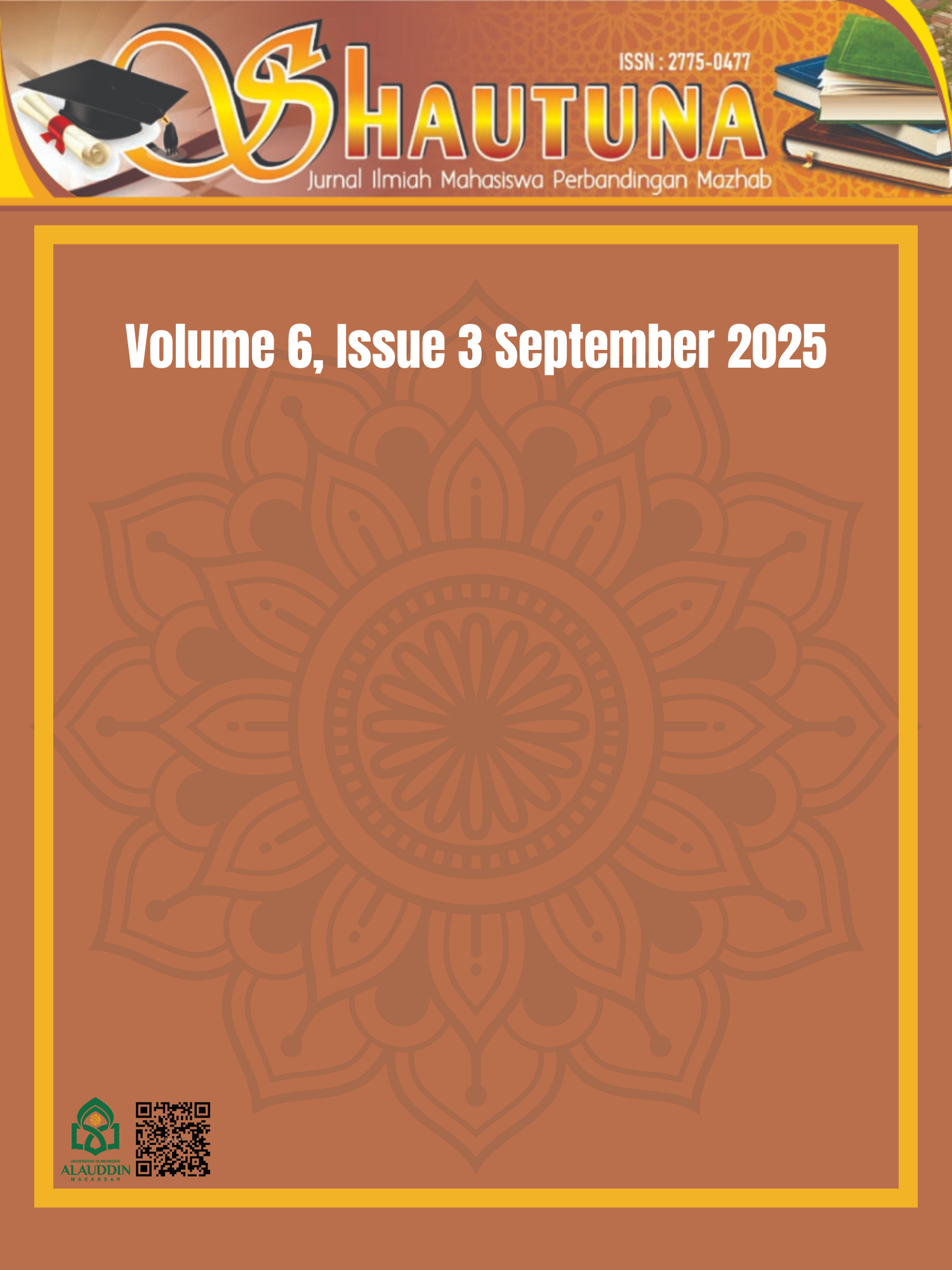Protection of the Institution of Marriage through the Principle of Making Divorce Difficult
An Analysis of Maqasid al-Syari‘ah on Practices in the Sinjai Religious Court
DOI:
https://doi.org/10.24252/shautuna.v6i3.56876Keywords:
Judge of the Religious Court of Banggai, Indonesia, Principle of Making Divorce Difficult, Maqashid al-Shariah, Sinjai Religious CourtAbstract
This study is motivated by the high divorce rate in Indonesia, which has implications for the fragility of the family institution and the weakening of social resilience, thus requiring legal mechanisms that can provide protection for the institution of marriage. One of the mechanisms applied in the religious court system is the principle of making divorce difficult, which normatively serves to prevent non-urgent divorces. This study aims to analyze the implementation of this principle in the Sinjai Religious Court and review its relevance to maqāṣid al-syarī‘ah. The research method uses a qualitative approach with a juridical-empirical model. Data were collected through court observations, interviews with judges, mediators, and litigants, as well as document and literature studies. The research instruments consisted of interview guidelines and field notes, while data analysis was carried out through the stages of reduction, data presentation, and conclusion verification. The results of the study show that the principle of making divorce difficult is implemented from the early stages of case registration, with the panel of judges attempting to reconcile the parties through advice and mediation in accordance with Supreme Court Regulation Number 1 of 2016. These reconciliation efforts continue throughout the trial process through a persuasive approach and the appointment of an official mediator. However, the application of this principle faces a number of obstacles, such as long-standing domestic conflicts, local cultural factors that tend to be permissive towards divorce, and economic pressures on families. From the perspective of maqāṣid al-syarī‘ah, the principle of making divorce difficult is in line with the objectives of protecting religion, life, reason, offspring, and property, while reducing the social harm caused by unnecessary divorce. Thus, the application of this principle in the Sinjai Religious Court serves not only as a formal procedure but also as a substantive instrument in maintaining the continuity of marriage, preventing premature divorce, and providing space for domestic reconciliation through mediation.
References
Abdullah, and Nur Aisyah. “Fenomena Faktor Dominan Tingginya Perceraian Di Kabupaten Maros.” Shautuna: Jurnal Ilmiah Mahasisawa Perbandingan Mazhab 4, no. 3 (2023): 1021–36. https://doi.org/10.24252/shautuna.v4i3.33183.
Akmal, Andi Muhammad, and Mulham Jaki Asti. “Problematika Nikah Siri, Nikah Online Dan Talak Siri Serta Implikasi Hukumnya Dalam Fikih Nikah.” Al-Risalah: Jurnal Ilmu Syariah Dan Hukum 21, no. 1 (2021): 45–59. https://doi.org/10.24252/al-risalah.v1i1.22247.
Amin, Abd Rauf Muhammad. Ijtihad Maqasidi Pendekatan Hukum Islam. Palu: Pesantren Darul Qur’an, 2024.
———. “Implementation of Maqasid Al-Syariah Contemporary Perspective.” Journal of Social Transformation and Regional Development 2, no. 3 (2020): 189–200. https://doi.org/10.30880/jstard.2020.02.03.023.
Anton, Anton, Ismi Siti Fauziah, Idma Firdaus, Ahmad Syauqi Munjaji, and Nurul Hasanah. “Ketentuan Pernikahan Menurut Perspektif Islam.” Jurnal Intelek Insan Cendikia 2, no. 1 (2025): 1320–29. https://jicnusantara.com/index.php/jiic/article/view/2333.
Artani, Mauresti Dwi Putri. “Pandangan Hakim Terhadap Asas Mempersulit Perceraian Di Pengadilan Agama Maumere Perspektif Sadd Al-Dzari’ah.” Universitas Islam Negeri Maulana Malik Ibrahim, 2022. http://etheses.uin-malang.ac.id/42643/.
Bukido, Rosdalina, and A Zainal Azhar Ishak. “Exploring the Verdict of Interfaith Marriage under Maqasid Sharia Insights.” Mazahibuna: Jurnal Perbandingan Mazhab 6, no. 1 (2024): 65–79. https://doi.org/10.24252/mazahibuna.vi.43025.
Dahwadin, Dahwadin, Enceng Iip Syaripudin, Eva Sofiawati, and Muhamad Dani Somantri. “Hakikat Perceraian Berdasarkan Ketentuan Hukum Islam Di Indonesia.” YUDISIA : Jurnal Pemikiran Hukum Dan Hukum Islam 11, no. 1 (2020): 87–104. https://doi.org/10.21043/yudisia.v11i1.3622.
Harahap, Hasbiah Tunnaim, Sukiati Sukiati, and Muhammad Yadi Harahap. “Yurisprudensi Hukum Mafqud Sebagai Alasan Gugatan Cerai Melalui Putusan Pengadilan (Putusan Nomor 0027/Pdt.G/2016/PA.Srog).” Innovative: Journal Of Social Science Research 5, no. 4 (2025): 88–110. https://doi.org/10.31004/innovative.v5i4.20046.
Hayat, Aay Siti. “Formula Pemeliharaan Jiwa (Hifz Al-Nafs) Pada Undang-Undang Nomor 16 Tahun 2019.” Islamic Review: Jurnal Riset Dan Kajian Keislaman 9, no. 1 (2020): 115–41. https://doi.org/10.35878/islamicreview.v9i1.195.
Hermansyah, Hermansyah. “Interpretasi Asas Mempersulit Perceraian Dalam Perspektif Hukum Islam.” As-Syar’i: Jurnal Bimbingan & Konseling Keluarga 6, no. 1 (2024): 1110–21. https://doi.org/10.47467/as.v6i1.6307.
Heryani, M. Hasbi Umar, and Bahrul Ulum. “Hak Perempuan Dalam Amar Putusan Cerai Menurut Perspektif Maqashid Syari’ah Pada Pengadilan Agama Kuala Tungkal Kelas 1B.” Mutiara: Jurnal Ilmiah Multidisiplin Indonesia 2, no. 4 (2024): 173–91. https://doi.org/10.61404/jimi.v2i4.276.
Humaeroh, Humaeroh, and Nita Anggraeni. “Perspektif Maqasid Syari’ah Terhadap Alasan Perceraian Karena Perselisihan Yang Dipicu Salah Satu Pihak Pengikut Aliran Syiah.” Syakhsia: Jurnal Hukum Perdata Islam 22, no. 1 (2021): 99–110. https://doi.org/10.37035/syakhsia.v22i1.4878.
Husaini, Achmad. “Analisis Hukum Perceraian Dalam Perspektif Kompilasi Hukum Islam.” Aainul Haq: Jurnal Hukum Keluarga Islam 4, no. 1 (2024). https://ejournal.an-nadwah.ac.id/index.php/ainulhaq/article/view/712.
Ihsan, Zuhdan, and Ruston Kumaini. “Praktik Ta’awun Dalam Rumah Tangga: Perempuan Sebagai Penanggung Jawab Ekonomi Keluarga Di Desa Sumberjambe.” USRAH: Jurnal Hukum Keluarga Islam 6, no. 4 (2025): 92–110. https://doi.org/10.46773/usrah.v6i4.2332.
Islam, Mohammad Rasikhul. “Pembagian Maqashid Al-Syari’ah Berdasarkan Pengaruhnya Terhadap Umat Manusia (Dharuriyyat, Hajiyyat Dan Tahsiniyat).” Celestial Law Journal 1, no. 1 (2024): 93–105. http://journal.unsuri.ac.id/index.php/clj/en/article/view/523.
Jain, Gunjan. “Significance of Marriage as Social Institution in Indian English Writings.” Soc Values Soc 1, no. 1 (2019): 17–22. https://doi.org/10.26480/svs.01.2019.17.22.
Kusmardani, Alex, Abdulah Syafe’i, Usep Saifulah, and Nurrohman Syarif. “Faktor-Faktor Penyebab Perceraian Dalam Perspektif Hukum Keluarga Antar Madzhab Islam Dan Realita Sosial.” Jurnal Syntax Imperatif: Jurnal Ilmu Sosial Dan Pendidikan 3, no. 3 (2022): 176–94. https://doi.org/10.36418/syntax-imperatif.v3i3.168.
Maidin, Sabir. “Nikah Mut’ah Perspektif Hadis Nabi Saw.” Mazahibuna: Jurnal Perbandingan Mazhab 1, no. 2 (2019): 216–33. https://doi.org/10.24252/mh.v1i2.11649.
Downloads
Published
How to Cite
Issue
Section
License
Copyright (c) 2025 Akmal Ariani, Muh. Yusuf, Nisaul Haq Bintu Has

This work is licensed under a Creative Commons Attribution 4.0 International License.









